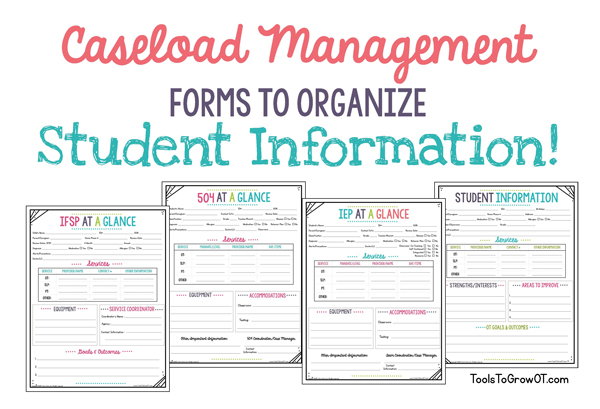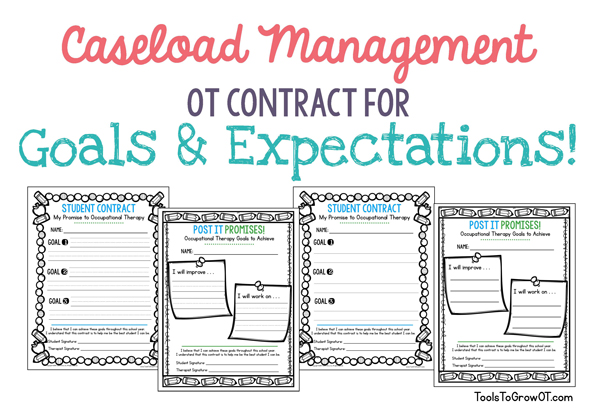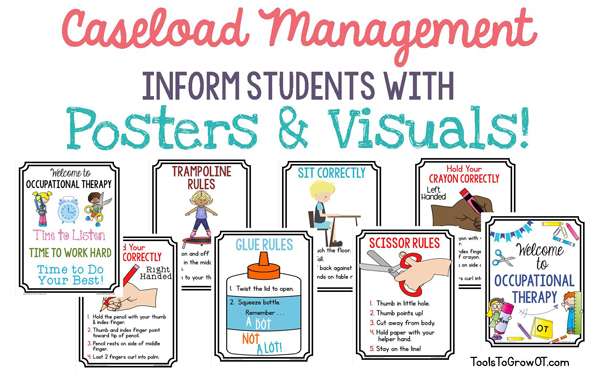Minimizing Challenging Behavior During Occupational Therapy Sessions
07.12.2015
All pediatric Occupational Therapists can envision a highly effective therapy session. The child is very happy to join you, and then becomes completely engaged in the activity. He or she is motivated to persevere with a challenging task and accepts your verbal cues and physical handling designed to facilitate optimal performance. Before departing the child demonstrates an emerging or fully developed new skill. Better yet…on subsequent sessions you observe or learn through report that the child uses these skills during his or her daily life!
This ideal scenario should be the norm, right? After all…you have the education. You have the knowledge about development. You are empathetic and caring. You want the best for the child. You are offering excellent toys and/or interesting materials.
So…why is the child not cooperating? Certainly every child and therapist have an “off day”, but if you are feeling plagued by ongoing difficulty bringing out the best in some of the children on your caseload, it may help to consider some of the following ideas. It always helps to ponder and reassess how we plan, intervene, and modify our treatments for each individual child.

New Referral - Thoroughly review each child’s medical history and educational background. Be sure to understand the child’s overall status, not just the physical limitations. While this sounds obvious, therapists that misunderstand the child’s cognitive and language skills may overwhelm or underwhelm a child. Feeling overly stressed due to excessive demands or bored due to being unchallenged can cause disruptive behavior. Is the child shutting down due to respiratory compromise from the asthma diagnosis that you may have been overlooked? Is there a hearing loss that was buried in the paperwork? Is the child’s affect and/or idiosyncrasies due to medication side effects? Determine which things should be addressed versus monitored during therapy sessions. What experience has the child had with structured situations? Perhaps the child is frightened. As the saying goes…pick your battles wisely!
Tools to Grow is pleased to offer Caseload Management Resources to help organize your caseload and get to know your students/clients. Use these forms at the beginning of a new school year and as your caseload expands.
 Organize IEPs, IFSPs, 504s, and Student Information. Simply print one form for each student/child and enter the information. Stay organized and manage each student’s/ child's vital information onto one form. Allows for a great way to consolidate and highlight important information, contact information, alerts/precautions, medical information (doctor and medication), other therapy/services, equipment, service coordinator/case manager information, and goals/outcomes. Find these forms and many more caseload management resources here.
Organize IEPs, IFSPs, 504s, and Student Information. Simply print one form for each student/child and enter the information. Stay organized and manage each student’s/ child's vital information onto one form. Allows for a great way to consolidate and highlight important information, contact information, alerts/precautions, medical information (doctor and medication), other therapy/services, equipment, service coordinator/case manager information, and goals/outcomes. Find these forms and many more caseload management resources here.

Get to know your students with these fun resources! "All About Me Handwriting" and "All About Me Coloring" resources are great for the beginning of a new school year, or when a new child comes on your caseload. These fun and motivating questionnaires and coloring resources allow the child to print their name, age/grade, and favorite things. For those students that do not write, there is an option to draw or the therapist can record information on the child’s behalf. Discover the child’s likes and interests for treatment planning. You will also gain great baseline information, such as pencil grasp, handwriting skills, task adherence, and organizational skills.
Set Limits and Boundaries - Use initial sessions to clearly establish expectations. These expectations will certainly be dependent upon several factors such as the child’s age, health, and developmental level. Consider which style of therapy will best suit each child. Will you need to use a child centered approach following their lead, or will you lean toward an adult directed format? How about a combination? Will you be treating in the community (playground or library), clinic, hospital, classroom, or child’s home? The setting in which the therapy occurs will affect the expectations. If it is a school based situation, will visuals such as posters with rules be helpful? How about a contract that the student signs? If providing therapy in the child’s home you are the guest. You will need to discuss the parent’s expectations and your role versus their role in terms of the child’s behavior.
Tools to Grow offers "OT Contract" Forms and "Post It Promise" Forms to allow students to take ownership of the therapy goals and expectations. Both resources are available in 3-Lined and Single Lined paper to accommodate varying handwriting abilities.
Posters and Visuals are another great way to set limits and boundaries. Tools to Grow offers a wide range of posters, rules, expectations, and visuals to add to your therapy space. Find all these Posters, Visuals, and more here! Be sure to download the FREE "Welcome to Occupational Therapy" Poster, available in both Color & Black/White Versions. A great way to remind students of rules prior to entering OT room/clinic/area and/or during OT sessions. "Welcome to OT- Time To Listen, Work Hard, Have Fun!"
Be Proactive, Not Reactive - Once again, there are surely many variables to consider when making a treatment plan, but here are a few ideas to consider. Some children are intolerant of sitting down just after transitioning to OT, other children need to sit down right away. This can be a good starting point for the rest of the session. Once you learn their preferences, use them to your advantage. Some children will attempt to reach and grasp many things off the shelf or out of your “bag”. If so have a plan for this. Will you allow the child to select one thing or will he/she need to wait until completing one task/activity directed by the OT before he/she selects?
Can You Live with Their Choice? - There is usually some point in therapy that a child will be expected to engage in a non-preferred task. To minimize non-compliance when expecting a child to follow through with such a task, consider giving a choice of two. Just make sure they are choices that are consistent with the treatment plan. For example, if you would like the child to color, but he/she has been intolerant of paper/crayon tasks, do not ask the child if he/she would like to color. What will you do if he/she responds “NO”? Instead try the following…“You are going to color, would you like a skinny or chunky crayon?” Or… “You are going to wash your hands, would you like to use this soap or that soap?”
Transitions- You may need to adjust the therapy schedule if fatigue, hunger, or other significant issues affect the child’s transition into therapy. For a child receiving home based intervention, is the time too early in the morning, too close to nap time, or disrupted by having all his/her siblings at home? Expect parents to ease the transition by anticipating your arrival; turn off the television, have diaper changed, etc. For a child receiving therapy at a school, upon arrival ask the teacher what type of day the child is having, how is the child’s health, anything special going on in child’s life?
Set The Stage- Rather than running down the hall and wandering around the therapy setting, teach the child where and how to stand, sit, and walk. Does the child need physical boundaries to facilitate attention and focus? Can the child tolerate a busy environment with many people and objects? Is a secluded area with limited objects and decorations better suited for this child? Some children, those that tend to “run-away”, may need to briefly sit in a special chair in-between movement activities. If treating in a child’s home, he/she may benefit from sitting on a blanket to establish boundaries.
Do Not Crumble- If you have established a consequence for non-compliance be sure to follow through. If you do not, the child will quickly learn that the rules and standards are not real. This certainly seems obvious, but often overlooked. Remember children generally thrive with structure and consistency.
Team Approach- If the child already has a previously established behavior plan it may not be necessary, or desirable, to re-invent the wheel. For other students that seem to only challenge you, ask other providers and family members which strategies were successful for them in the past. Do your best to connect with the child’s intervention team. Sure we are all busy, but remember we have been trusted to care for the most vulnerable…disabled, sick, and/or injured children.
Control Yourself- Waiting can be so difficult for a child. Calming down after an exciting gross motor activity can also be very difficult. Sharing and turn taking can be oh so tricky. Helping a child learn how to regulate his movement, emotions, talking, and impulsiveness may be one of the biggest accomplishments you may help a child achieve. Improvements in self-regulation will have a huge impact on his/her overall performance. Are you looking for a simple intervention for use as part of a child’s sensory diet to help with self-regulation? If so, we have a practical and effective tool for you! Tools to Grow’s "Sensory Star" Program is just what you are looking for!
The “Sensory Star” Program is a great tool to:
- Promote self-regulation
- Promote optimal arousal
- Promote a calm body
- Minimize fidgeting and restlessness
- Decrease stress and anxiety
- Improve focus and attention
The “Sensory Star” Program includes two versions based on the child’s environment - school and home. Read our blog here to find out more about this convenient and appealing way to promote self-regulation in both the school and home/community settings.
Be Patient- Just as it may be difficult for a child to be patient, one of the challenging aspects of being a therapist may be dealing with children that progress slowly. If the child detects any frustration on your part, negative behavior may surface. One of the best ways to manage this is to focus on small goals. Make the effort to improve your evaluation skills; this will help you pinpoint tiny changes in the child’s movement, posture, attention, ocular motor, and other functional areas.
Do You Hear Me?-Pick your wording and other verbal cues carefully. Be sure to use language that the child understands when providing directions. Using long explanations with vocabulary beyond the child’s receptive language level will cause frustration and confusion. Also, excessive talking on the therapist’s part may agitate a child. Determine if lowering your voice volume and offering a comforting hand will improve rapport and cooperation. Many children ae intrigued and change their affect when an adult whispers. For children with severe speech and language delays, be sure to use the communication devices that are established.
Be Quiet- Use therapeutic physical handling rather than ongoing verbal directions. Facilitating a desired response through handling can be much more effective than explaining such. Besides, depending upon the child’s needs, handling can be very powerful for calming or alerting.
Just Right Challenge- Offering a task/activity that is too challenging or too easy may contribute to rebellion, withdrawal, or rejection of the task and therapy process. “Think on your feet” and adjust quickly if needed.
Meaningful Activities- Take care to design a treatment plan that incorporates developmentally and age appropriate tasks/activities aimed at improving the targeted performance area. Capitalize on the child’s strengths (ex: organized, likes to please adults, eager to learn, flexible, friendly, etc.) and interests (ex: sports, crafts, movies, television shows, cooking, music, etc.) to optimize their participation. Always entice rather than coerce. Never humiliate a child into performing a task. Tools to Grow has two FREE "All About Me" Craftivities: (1) Wel-GUM To OT Gumball Activity, and (2) All About Me Flag Banner. These FREE Printable activities are a great way to get to know your students! You can find them here!
Rewards- Most children will not require rewards for complying or following through with therapy. The intrinsic reward of a positive social interaction and participating in a meaningful activity is enough positive feedback. Some children, however, will benefit from a formal reward system. Tools to Grow offers reward hole-punch cards for students that can benefit from a tangible reward, but can also defer gratification. Not only do these reward cards offer an effective incentive for cooperation, they also address many other skills! We have seen firsthand as a student progresses from being unable to utilize a hole-punch in September, to becoming completely independent. It has been so gratifying to watch as each child’s determination, motor planning, hand strength, bilateral coordination, and eye-hand coordination improves.
Awards and Certificates are also a great way to reward a child’s accomplishments in a variety of performance areas. Presenting a child with one of these creative certificates is a meaningful way to acknowledge his or her effort and success. You can find a variety of Occupational Therapy awards here. These include: Shoe Tying, Printing your Name, Using Scissors, Get Dressed, and Graduating Occupational Therapy. Download the FREE "I Can Print my Name" award here!!
Tools to Grow sincerely wishes you the best as you develop rapport and positive relationships with all the wonderful children in your life!
We hope these invaluable resources and strategies will provide you with the tools necessary to help with the most important job there is … helping children grow!
Related Topics: Caseload Management, Early Intervention , Free Resources , School Based OT, Sensory Processing/Self-Regulation, Tools to Grow at Home , Tools to Grow at School







